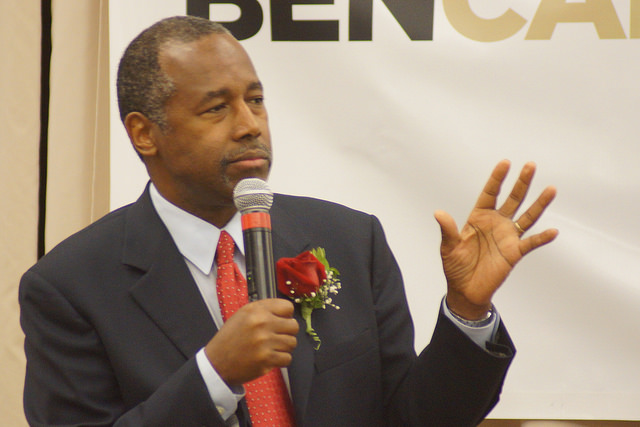
Christine Gianakis, a Political Science and Communications major, is in her second year as a columnist for The Montclarion.
The doctor is in…denial. This past week, the media uncovered that key moments of Ben Carson’s life, depicted through movies and books, have been fabricated and embellished by the presidential hopeful.
Carson is currently undergoing scrutiny for stories, including his claims that he attempted to stab someone when he was in high school due to anger issues, that he sheltered white students during the MLK assassination riots and that he was offered a full scholarship to West Point Military Academy, which he forwent to study medicine. After being tested by the media for accuracy, these biographical claims made by Carson appear to be inflated.
In the Politico story “Exclusive: Carson claimed West Point ‘scholarship’ but never applied,” Kyle Cheney cites Theresa Brinkerhoff, a spokeswoman for West Point, to confirm that no application record exists for Carson to the school. His story of turning down the offer to pursue medicine has been an important narrative in his campaign monologue, but why?
Why would a renowned neurosurgeon seek fake prestige from such a deceptive story? It’s easy to chalk it up to inexperience. One could say that Carson wrote this story back before he ever had the intention to run for president and he never thought his embellishments would be tested, but he has continued to reference it even after the launch of his campaign.
Carson told CNN’s Alisyn Camerota on New Day, “[the reports are] a bunch of lies attempting to say I’m lying about my history. I think it’s pathetic and basically what the media does is they try to get you distracted.”
Did Carson really expect the media not to fact check his autobiography? He is a high profile figure running to become the leader of the United States. Nothing is off limits, especially falsification. What may be more troubling than his blatant disregard for accuracy in his manipulation of the stories is an attempt to blame journalists for doing their due diligence and reporting the facts.
The whole foundation of an outsider candidate is their platform of trust. They run on the premise that they are immune to the usual political corruption because they have never consumed the Washington Kool-aid. Carson sold this idea to the American people and they took him at his word. Running on the outsider platform is not a pardon from standard political vetting, but rather is something that accompanies every election.
Impression management is a manipulation of others’ perceptions toward a person using tactics such as picking and choosing what information people will learn about them in an attempt to influence their perceptions.
This is exactly what the Carson campaign did through these embellished stories. By shaping his personal anecdotes to include only information he hoped would strengthen his approval, Carson betrayed the trust of the American people by ignoring and overlooking the truth.
As an outsider candidate with no political experience, Carson’s candidacy has little to offer the American people without trust. As of now, the neurosurgeon’s prognosis does not look good. The media has prescribed him a large dose of humble pie, but until Carson agrees to follow doctor’s orders, voters will start to look for a second opinion on whom they should select to lead the country.



